You’ve likely found yourself both amused and puzzled by those viral videos where cats encounter cucumbers and bolt away in sheer panic.
This phenomenon has not only become a source of internet entertainment but has also sparked both curiosity and concern among cat owners globally.
Why are cats afraid of cucumbers, and what does this reveal about their other fears, including cat anxiety?
This article delves deep into the heart of this bizarre fear, aiming to demystify the reasons behind it and explore the broader implications for your furry friend’s well-being and happiness.
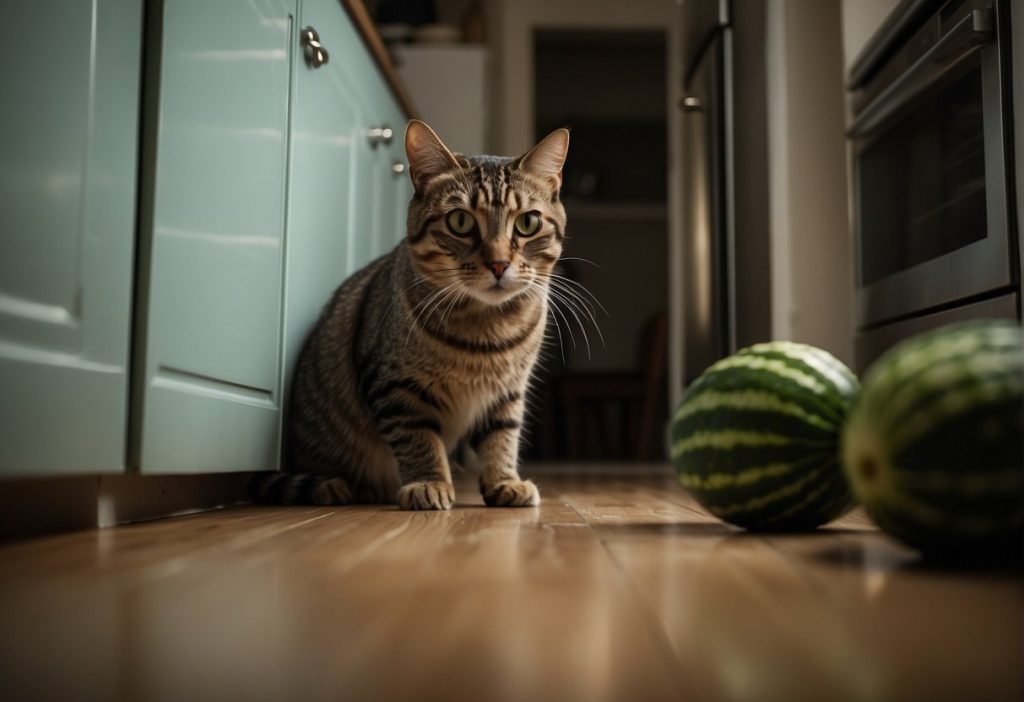
With insights from experts in feline behavior, we will explore the potential causes and solutions for cat anxiety, and how to help your furry friend feel more relaxed and at ease in their environment.
Whether these fears are harmful to your cat’s well-being or what they reveal about their instincts, understanding them is crucial to understanding your companion’s relationship with the world around them.
Key Takeaways
- Videos of cats startled by cucumbers highlight their instinctual fear response.
- Cat owners are eager to understand and address their pets’ reactions to unexpected stimuli.
- The exploration of this behavior can enhance overall cat care and promote their well-being.
Why Are Cats Are Afraid of Cucumbers?
These clips have racked up millions of views across social media platforms, turning the feline fear of cucumbers into an unlikely internet sensation.
So, what’s up with this cucumber chaos? It turns out, your furry friend’s freakout is wired deep into their instincts.
When you sneak a cucumber behind a cat, its elongated shape might pass for a snake at first glance.
Cats are no fans of snakes, and the possibility of one lurking by their food bowl can trigger a natural fear of snakes and a whisker-twitching alert.
Your pet kitty’s ancestors had to be on the constant lookout for slithery predators, and this ancient instinct hasn’t been entirely purged from your modern-day mouser.
The fear response is part of a cat’s survival kit – an involuntary rush of adrenaline that preps them for a fight-or-flight reaction.
This isn’t unique to cucumbers; anything from the zoom of a vacuum cleaner to the bang of a slammed door can trigger their fear response, as they may perceive it as an intruder in their home.
- Common triggers for a feline’s fight-or-flight response include: Loud noises
- Sudden movements
- Unknown or new objects in their environment
Why the intense reaction? Well, it’s all about surprise. Cats prefer predictability, especially when they’re in the middle of a satisfying meal or a grooming session. (1)
Unexpectedly finding a ‘predator’ behind them can scorch their nerves, making them leap out of their fur!
Remember, what can be a laugh for you could be a real scare for your fluffball. Now that you’re in the know, let’s keep cucumbers on the salad plate and away from our unsuspecting cats.
Theories Behind the Fear
Turns out, they’re a pretty big hit online. Social media platforms have clocked millions of views on these crazy cat-cucumber encounters, making it a widespread and quite puzzling phenomenon.
The Curious Case of Cats and Cucumbers
One theory suggests that cucumbers resemble snakes. It’s no joke! To a cat, that sneaky green object might just be a lurking predator.
Cats have evolved to be on high alert, and anything that slithers—or looks like it could—triggers their deep-seated survival instincts.
Decoding the Fear Response in Cats
Why does this happen? Well, think about how you’d respond if something unexpected popped up behind you. That jolt you’d feel is the fight-or-flight response, and it’s not just a human thing.
Cats experience it too, whether it’s from a loud bang a quick movement, or even a jump scare. It keeps them safe from actual dangers, but sometimes, a harmless cucumber can set it off too.
Could it be something more? Possibly. Some cats may just be particularly cautious of anything appearing without warning, particularly when they’re chowing down.
It’s the perfect storm for a spooked kitty: vulnerability meets surprise.
Remember, it’s not all cats that hit the ceiling at the sight of a cucumber. Like us, they’re individuals with their quirks and fears.
But if millions of online reactions are anything to go by, a cucumber can certainly cause a comical leap!
So, before you decide to test this out with your cat, think about their poor little hearts.
Expert Insights on Cats’ Reactions
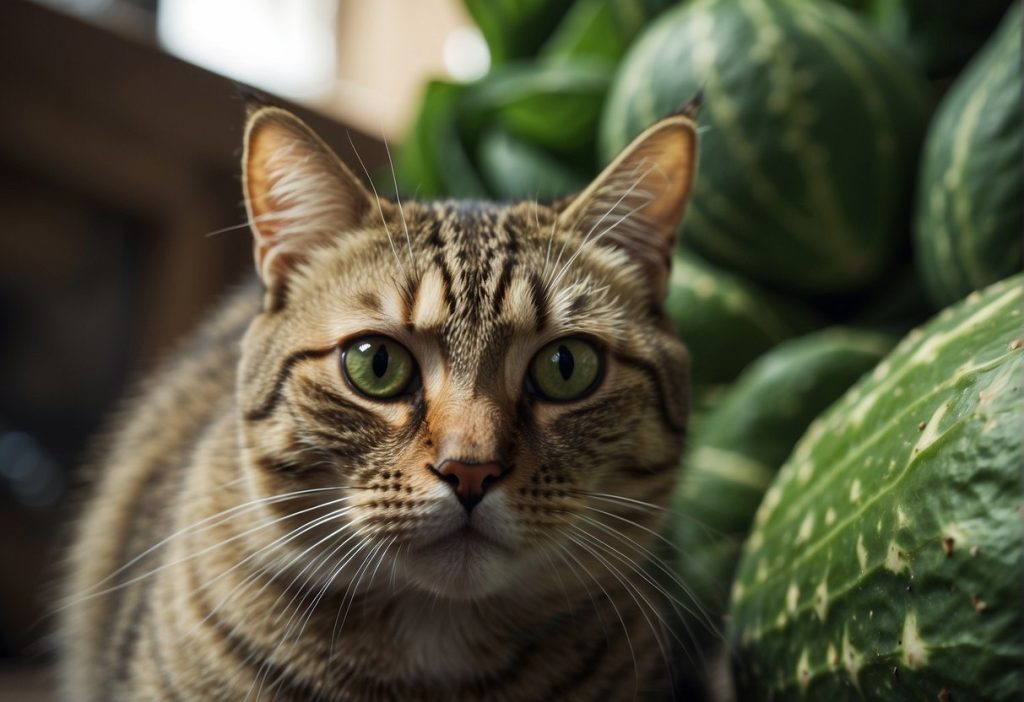
Experts have plenty to say on the matter.
Behaviorist’s Take
You might have seen Dr. Pamela Perry’s thoughts floating around. She points out that cats may respond to cucumbers because they’re surprised by a new object magically appearing in their safe space.
Imagine chilling at home and a wild unicycle appears; you’d jump too, right?
Vet Speaks Out
Then there’s Gary Richter, DVM, who insists that scaring cats for a laugh with cucumbers (or anything, really) is a big no-no for their wellbeing. So, let’s agree that pranking our pets is off the table.
Social Media’s Role
It’s no secret that social media has a knack for hyping things up. Cute cat and quirky cucumber content is instant clickbait.
However, some viral content can make us believe in things that are not quite accurate, like our furry pals having a born fear of cucumbers.
Misunderstandings Abound on the Web
It’s easy to misconstrue animal behavior online. What may seem like a harmless joke can sometimes hide an animal feeling petrified.
Yikes! So, next time you stumble upon one of those infamous videos, remember there’s more than meets the eye.
They’ll love you for it, and you’ll get the peace of mind that comes from not having a scaredy-cat. Keep spreading kindness, one purr at a time!
Enhancing Cat Well-being and Engagement
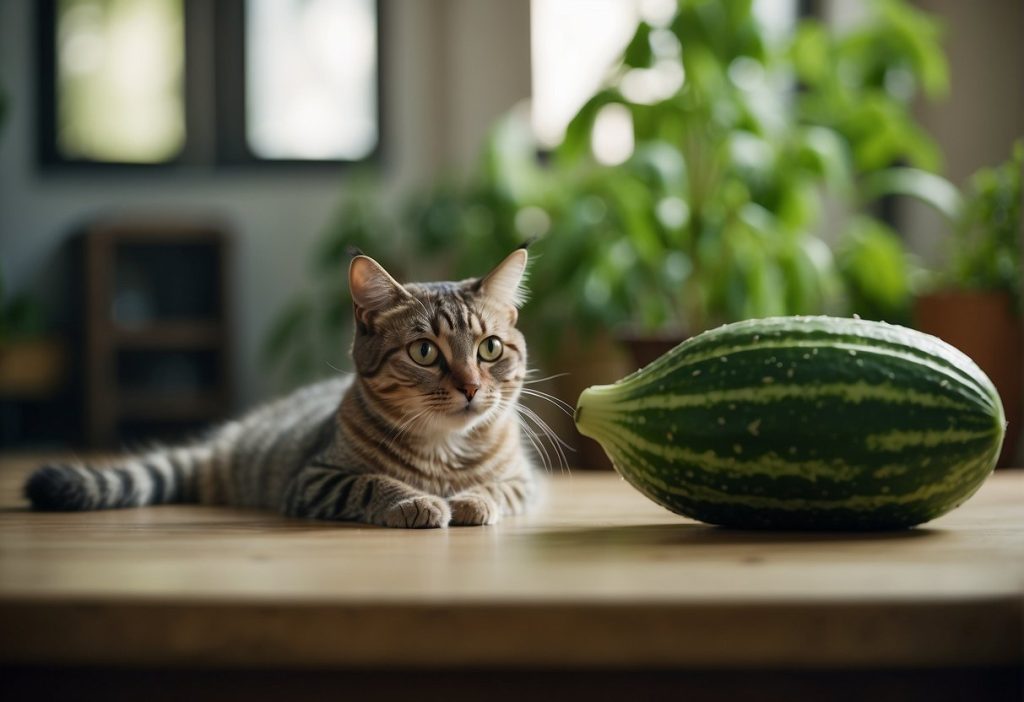
Toys that stimulate hunting instincts, like feather wands or laser pointers, can provide hours of amusement and exercise. (2)
Positive Reinforcement
Here are some paws-itively effective techniques:
- Treats: Reward your cat for positive behavior with their favorite snack.
- Praise: A gentle stroke or kind words can make all the difference.
- Clicker Training: Combine a clicker sound with a treat to reinforce good behavior.
Reducing Stress and Anxiety
Keeping your cat calm is simpler than herding cats! Just remember these strategies:
- Safe Spaces: Cardboard boxes or perches offer perfect hideaways.
- Routine: Like clockwork, consistent meals, and playtimes help kitties feel secure.
- Interactive Toys: Puzzle feeders engage their brains and bodies.
Remember, a cucumber-free zone is a stress-free zone. Keep your cat’s environment predictable, and you’ll both be purring in contentment.
Happy and healthy cats are the cat’s meow, and with these tips, you’re well on your way to being the purr-fect pet parent!
Scientific and Expert Perspectives
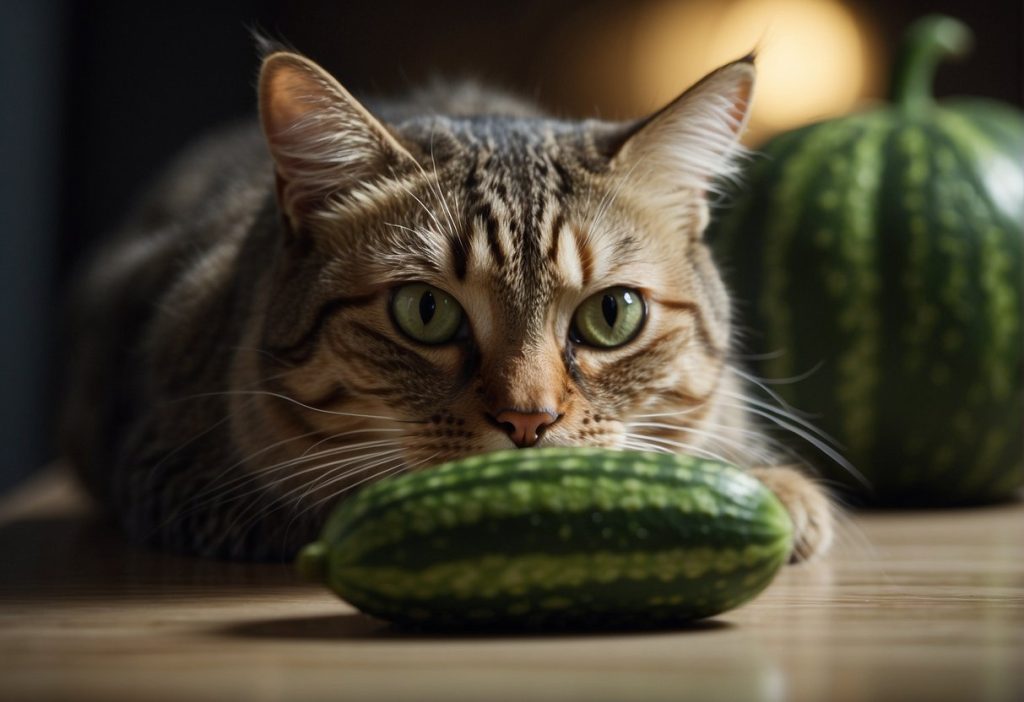
Let’s get into the nitty-gritty of why our feline friends might be spooked by this common veggie.
First off, veterinarians and animal behaviorists chalk up this fear for a few reasons. Your cat isn’t a fan of surprises.
Imagine how jumpy you’d be if a toaster popped without a heads-up! Studies on feline behavior suggest that cats have a sensitive fight or flight response to the unexpected, and cucumbers can trigger that big time.
According to Joey Lusvardi, a cat behavior consultant, humans, and other animals would likely have a similar response to a sudden object appearing behind them.
As Lusvardi explains, “If you’re digging for something in your fridge and when you turn around, there’s a box sitting on the ground behind you that wasn’t there before, you’re likely going to be startled and confused.”
Now, let’s talk stats. Did you know that stress-related behaviors are fairly common in our feline companions? (3)
Factors like sudden changes in the environment can up the ante on their nerves. When a cucumber appears out of nowhere, your cat might see it as a potential threat – maybe even a snake-shaped danger!
But here’s the good news. Experts share that with the right care, a cat’s stress can be greatly reduced. You can spot signs of stress by watching for:
- Hiding
- Aggressive behavior (4)
- Changes in eating habits
If you see these cues, it might be time for some environmental adjustments.
A case study or two has shown that when our whiskered friends are given a consistent and cucumber-free habitat, they chill out significantly.
So, remember, while it might be tempting to test the cucumber scare myth on your kitty, you should probably just leave it to their nine lives in dreamland.
Better to keep their stress levels down and the cucumbers in your salad, where they belong!
Quick Recap
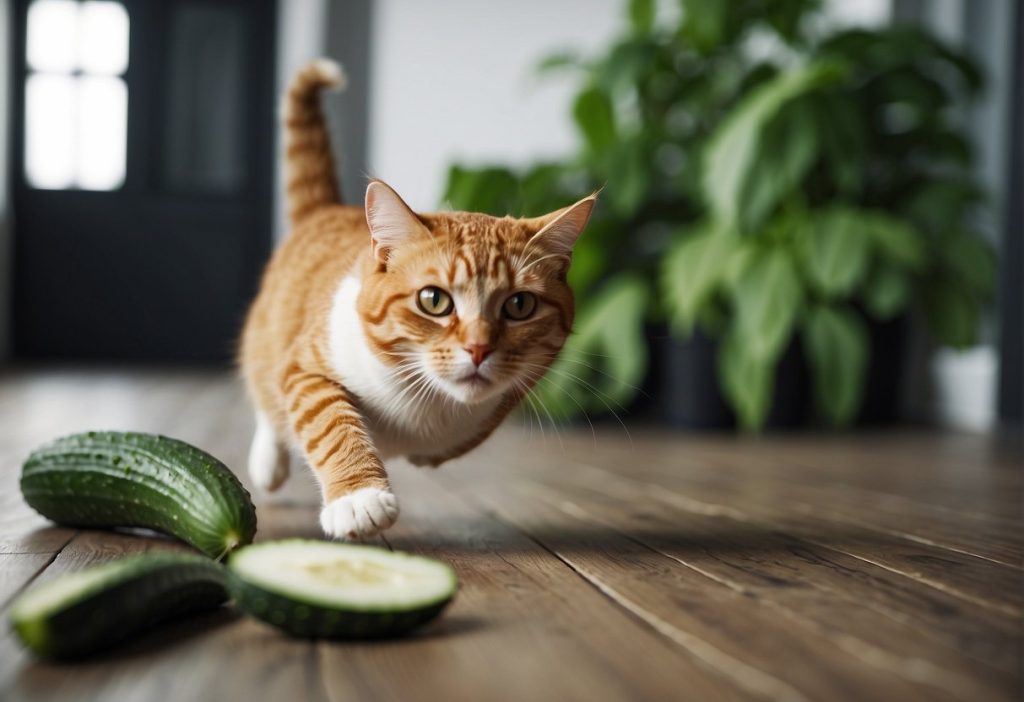
Ever wondered why your furry friend bolts at the sight of something as harmless as a cucumber? It turns out, their fears are rooted in instinct.
- Innate Fear Responses:
Cats are hardwired to be cautious of anything that their senses perceive as a threat, and cucumber can surprisingly resemble a predator like a snake. - Surprise Factor:
The unexpected presence of a new object, like a cucumber, can trigger a startling response. Cats rely heavily on their environment being predictable and stable. - Visual Deception:
While you know it’s a cucumber, your cat’s first instinct might be to interpret its snake-like shape as dangerous, eliciting a fear response.
Remember, your cat’s peace of mind should always come first. Here’s how you can help:
- Avoid Shock Tactics:
Scaring your cat for entertainment can lead to stress and anxiety. That’s no laughing matter! - Empathy Is Key:
Put yourself in their paws and understand that their reactions are natural. Be kind and comforting if they get scared.
Interested in learning more about your cat’s quirky behaviors? Delve into the wealth of knowledge available from veterinarians and feline behaviorists.
They’ve got the lowdown on all things cat, from their biggest fears to their unique ways of showing love.
Stay tuned into your cat’s needs and make sure your home is a cucumber-free comfort zone – unless, of course, it’s safely a part of their diet. Happy and relaxed cats mean happy pet parents!
Frequently Asked Questions
In this section, we’ll tackle some common queries you might have about cats and their often humorous, sometimes startling reactions to cucumbers.
Let’s explore why your feline friend may leap at the sight of a green gourd and how you can ensure their well-being.
Why do cats jump when they see cucumbers?
Cats may jump when they see cucumbers because they mistake them for predators, like snakes.
It’s the surprise factor of finding an unexpected object behind them that triggers their startled response.
Is it harmful to scare cats with cucumbers?
Yes, it’s harmful to scare cats with cucumbers.
Such pranks can cause stress and anxiety, which can lead to behavioral issues or health problems for your cat.
How can I reduce my cat’s stress levels?
You can reduce your cat’s stress levels by maintaining a peaceful, stable environment.
Regular playtime, soothing music, and providing secure hiding spots can help keep your cat calm.
What are some signs of stress in cats?
Signs of stress in cats include excessive grooming, changes in eating or toilet habits, aggression, or withdrawal.
If you notice these behaviors, it’s time to assess your cat’s environment for stressors.
Can playing with my cat reduce its fear of unexpected objects?
Definitely! Regular play helps your cat build confidence and resilience, making them less likely to fear unexpected objects.
It’s also a great bonding activity for both of you.
Are there any safe alternatives to cucumbers for playing pranks on cats?
It’s best to steer clear of pranks that could scare your cat.
Instead, opt for engaging toys that stimulate your cat’s hunting instincts in a playful, non-threatening manner.
How can I make my home more comfortable for a stressed cat?
Making your home more comfortable for a stressed cat involves providing plenty of cozy beds, scratching posts, and access to windows for outdoor viewing.
Ensure they have their own space where they feel safe and secure.


